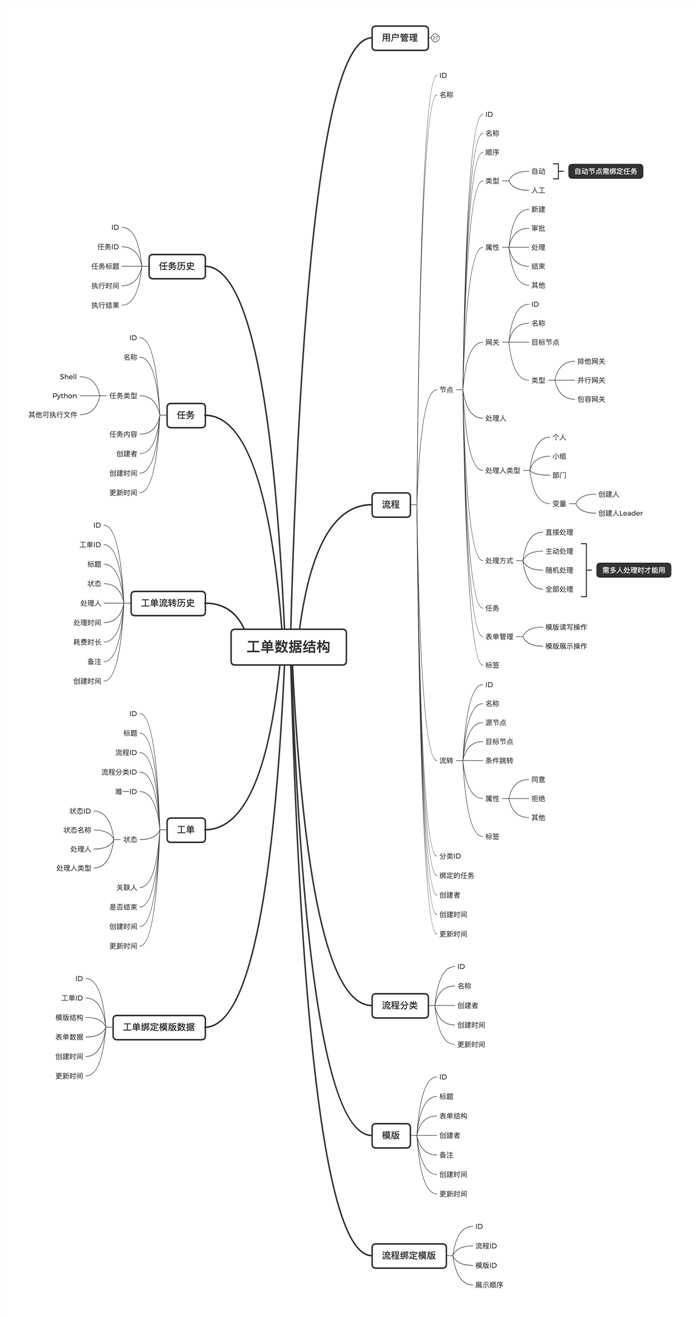非常叼的工单系统,工单结束,工作完成;非常叼的权限管控,精细到页面按钮及API
Posted
tags:
篇首语:本文由小常识网(cha138.com)小编为大家整理,主要介绍了非常叼的工单系统,工单结束,工作完成;非常叼的权限管控,精细到页面按钮及API相关的知识,希望对你有一定的参考价值。
最近在研究工单系统的时候,被我找到一个非常流弊的工单系统,我们都知道工单系统最麻烦的就是流程和模版的维护,并且,在工单处理过程中很可能会添加一些操作,这些操作被称之为钩子。就按我目前调研的结果来说,目前其实没有啥工单系统能实现的这么好的。
这个工单系统就把流程设计,模版设计等等做的非常不错,而且对权限的把控非常详细,包括API接口、菜单、页面按钮权限,都可以灵活的控制,非常的不错。
Demo:http://fdevops.com:8001/#/dashboard
Github:https://github.com/lanyulei/ferry
如果觉得不错就给作者一个star,你的star没准就是作者继续维护下去的动力呢。
功能介绍
系统管理
- 用户管理不仅仅包括了用户,还有角色、职位、部门的管理,方便后面的工单处理人扩展。
- 菜单管理,对菜单,页面按钮,甚至是API接口的管理。
- 登陆日志,对用户登陆和退出的日志记录。
流程中心
- 流程申请,对流程进行分类管理,方便维护与可视化。
- 工单列表,拆分了4个分类,包括:我待办的工单,我创建的工单,我相关的工单,还有所有工单。
- 转交工单,如果你当前有别的事情在处理就可以把工单转交给别人去处理。
- 结束工单,如果一个工单发展申请不对,权限足够的话,是可以直接结束工单的。
- 工单处理人的多样化,不仅可以个人处理,还可以是部门、角色、变量。
- 处理人变量,根据用户数据来自动获得是该谁处理,比如:创建人,创建人leader,HRBP等等。
- 会签,如果是多个选择人的话,并且勾选了会签功能,那么就需要这些负责人都处理完成后才会通过。
- 任务管理,可以给任何阶段绑定任务,相当于流程中的钩子操作,实现的效果就是,工单完成,任务也就执行完成了,减少很多的人力成本。
- 通知方式的灵活性,可以通过任务给每个阶段绑定通知方式,也可以给流程绑定全局通知。
- 网关,支持排他网关和并行网关,排他网关即通过条件判断,只要有一个条件通过,则可进入下一个阶段;并行网关,即必须所有的阶段都完成处理,才可以进行下一个阶段
- 后面还会有很多的功能扩展,包括:加签,催办,子流程等等。
等等还有很多功能待研究。
数据结构设计
对于一个完整的工作流系统来说,我们需要有流程、模版、分组、用户、任务等等,并且这些东西都是可以灵活定制的,因为如果不能灵活定制的话,对于普通的使用这来说是非常不方便的,所以对于一个好的工作流系统,是必须要实现灵活性的。
下面直接来展示一下,数据结构的设计图。

流程分类
type Classify struct {
base.Model
Name string `gorm:"column:name; type: varchar(128)" json:"name" form:"name"` // 分类名称
Creator int `gorm:"column:creator; type: int(11)" json:"creator" form:"creator"` // 创建者
}
func (Classify) TableName() string {
return "process_classify"
}流程
type Info struct {
base.Model
Name string `gorm:"column:name; type:varchar(128)" json:"name" form:"name"` // 流程名称
Structure json.RawMessage `gorm:"column:structure; type:json" json:"structure" form:"structure"` // 流程结构
Classify int `gorm:"column:classify; type:int(11)" json:"classify" form:"classify"` // 分类ID
Tpls json.RawMessage `gorm:"column:tpls; type:json" json:"tpls" form:"tpls"` // 模版
Task json.RawMessage `gorm:"column:task; type:json" json:"task" form:"task"` // 任务ID, array, 可执行多个任务,可以当成通知任务,每个节点都会去执行
Creator int `gorm:"column:creator; type:int(11)" json:"creator" form:"creator"` // 创建者
}
func (Info) TableName() string {
return "process_info"
}模版
type Info struct {
base.Model
Name string `gorm:"column:name; type: varchar(128)" json:"name" form:"name" binding:"required"` // 模板名称
FormStructure json.RawMessage `gorm:"column:form_structure; type: json" json:"form_structure" form:"form_structure" binding:"required"` // 表单结构
Creator int `gorm:"column:creator; type: int(11)" json:"creator" form:"creator"` // 创建者
Remarks string `gorm:"column:remarks; type: longtext" json:"remarks" form:"remarks"` // 备注
}
func (Info) TableName() string {
return "tpl_info"
}工单
type Info struct {
base.Model
Title string `gorm:"column:title; type:varchar(128)" json:"title" form:"title"` // 工单标题
Process int `gorm:"column:process; type:int(11)" json:"process" form:"process"` // 流程ID
Classify int `gorm:"column:classify; type:int(11)" json:"classify" form:"classify"` // 分类ID
IsEnd int `gorm:"column:is_end; type:int(11); default:0" json:"is_end" form:"is_end"` // 是否结束, 0 未结束,1 已结束
State json.RawMessage `gorm:"column:state; type:json" json:"state" form:"state"` // 状态信息
RelatedPerson json.RawMessage `gorm:"column:related_person; type:json" json:"related_person" form:"related_person"` // 工单所有处理人
Creator int `gorm:"column:creator; type:int(11)" json:"creator" form:"creator"` // 创建人
}
func (Info) TableName() string {
return "work_order_info"
}工单绑定模版
type TplData struct {
base.Model
WorkOrder int `gorm:"column:work_order; type: int(11)" json:"work_order" form:"work_order"` // 工单ID
FormStructure json.RawMessage `gorm:"column:form_structure; type: json" json:"form_structure" form:"form_structure"` // 表单结构
FormData json.RawMessage `gorm:"column:form_data; type: json" json:"form_data" form:"form_data"` // 表单数据
}
func (TplData) TableName() string {
return "work_order_tpl_data"
}工单流转历史
type CirculationHistory struct {
base.Model
Title string `gorm:"column:title; type: varchar(128)" json:"title" form:"title"` // 工单标题
WorkOrder int `gorm:"column:work_order; type: int(11)" json:"work_order" form:"work_order"` // 工单ID
State string `gorm:"column:state; type: varchar(128)" json:"state" form:"state"` // 工单状态
Source string `gorm:"column:source; type: varchar(128)" json:"source" form:"source"` // 源节点ID
Target string `gorm:"column:target; type: varchar(128)" json:"target" form:"target"` // 目标节点ID
Circulation string `gorm:"column:circulation; type: varchar(128)" json:"circulation" form:"circulation"` // 流转ID
Processor string `gorm:"column:processor; type: varchar(45)" json:"processor" form:"processor"` // 处理人
ProcessorId int `gorm:"column:processor_id; type: int(11)" json:"processor_id" form:"processor_id"` // 处理人ID
CostDuration string `gorm:"column:cost_duration; type: varchar(128)" json:"cost_duration" form:"cost_duration"` // 处理时长
Remarks string `gorm:"column:remarks; type: longtext" json:"remarks" form:"remarks"` // 备注
}
func (CirculationHistory) TableName() string {
return "work_order_circulation_history"
}任务
type Info struct {
base.Model
Name string `gorm:"column:name; type: varchar(256)" json:"name" form:"name"` // 任务名称
TaskType string `gorm:"column:task_type; type: varchar(45)" json:"task_type" form:"task_type"` // 任务类型
Content string `gorm:"column:content; type: longtext" json:"content" form:"content"` // 任务内容
Creator int `gorm:"column:creator; type: int(11)" json:"creator" form:"creator"` // 创建者
Remarks string `gorm:"column:remarks; type: longtext" json:"remarks" form:"remarks"` // 备注
}
func (Info) TableName() string {
return "task_info"
}任务执行历史
type History struct {
base.Model
Task int `gorm:"column:task; type: int(11)" json:"task" form:"task"` // 任务ID
Name string `gorm:"column:name; type: varchar(256)" json:"name" form:"name"` // 任务名称
TaskType int `gorm:"column:task_type; type: int(11)" json:"task_type" form:"task_type"` // 任务类型, python, shell
ExecutionTime string `gorm:"column:execution_time; type: varchar(128)" json:"execution_time" form:"execution_time"` // 执行时间
Result string `gorm:"column:result; type: longtext" json:"result" form:"result"` // 任务返回
}
func (History) TableName() string {
return "task_history"
}安装部署
go >= 1.14
vue >= 2.6
npm >= 6.14二次开发
后端
# 1. 获取代码
git https://github.com/lanyulei/ferry.git
# 2. 进入工作路径
cd ./ferry
# 3. 修改配置 ferry/config/settings.dev.yml
vi ferry/config/settings.dev.yml
# 配置信息注意事项:
1. 程序的启动参数
2. 数据库的相关信息
3. 日志的路径
# 4. 初始化数据库
go run main.go init -c=config/settings.dev.yml
# 5. 启动程序
go run main.go server -c=config/settings.dev.yml前端
# 1. 获取代码
git https://github.com/lanyulei/ferry_web.git
# 2. 进入工作路径
cd ./ferry_web
# 3. 安装依赖
npm install
# 4. 启动程序
npm run dev上线部署
后端
# 1. 进入到项目路径下进行交叉编译(centos)
env GOOS=linux GOARCH=amd64 go build
更多交叉编译内容,请访问 https://www.fdevops.com/2020/03/08/go-locale-configuration
# 2. config目录上传到项目根路径下,并确认配置信息是否正确
vi ferry/config/settings.yml
# 配置信息注意事项:
1. 程序的启动参数
2. 数据库的相关信息
3. 日志的路径
# 3. 创建日志路径及静态文件经历
mkdir -p log static/uploadfile
# 4. 初始化数据
./ferry init -c=config/settings.yml
# 5. 启动程序,推荐通过"进程管理工具"进行启动维护
nohup ./ferry server -c=config/settings.yml > /dev/null 2>&1 &前端
# 1. 编译
npm run build:prod
# 2. 将dist目录上传至项目路径下即可。
mv dist web
# 3. nginx配置,根据业务自行调整即可
server {
listen 8001; # 监听端口
server_name localhost; # 域名可以有多个,用空格隔开
#charset koi8-r;
#access_log logs/host.access.log main;
location / {
root /data/ferry/web;
index index.html index.htm; #目录内的默认打开文件,如果没有匹配到index.html,则搜索index.htm,依次类推
}
#ssl配置省略
location /api {
# rewrite ^.+api/?(.*)$ /$1 break;
proxy_pass http://127.0.0.1:8002; #node api server 即需要代理的IP地址
proxy_redirect off;
proxy_set_header Host $host;
proxy_set_header X-Real-IP $remote_addr;
proxy_set_header X-Forwarded-For $proxy_add_x_forwarded_for;
}
# 登陆
location /login {
proxy_pass http://127.0.0.1:8002; #node api server 即需要代理的IP地址
}
# 刷新token
location /refresh_token {
proxy_pass http://127.0.0.1:8002; #node api server 即需要代理的IP地址
}
# 接口地址
location /swagger {
proxy_pass http://127.0.0.1:8002; #node api server 即需要代理的IP地址
}
# 后端静态文件路径
location /static/uploadfile {
proxy_pass http://127.0.0.1:8002; #node api server 即需要代理的IP地址
}
#error_page 404 /404.html; #对错误页面404.html 做了定向配置
# redirect server error pages to the static page /50x.html
#将服务器错误页面重定向到静态页面/50x.html
#
error_page 500 502 503 504 /50x.html;
location = /50x.html {
root html;
}
}自此项目就介绍完了,反正我觉得还是非常不错的,如果你也觉得不错,就给作者一个star吧。
以上是关于非常叼的工单系统,工单结束,工作完成;非常叼的权限管控,精细到页面按钮及API的主要内容,如果未能解决你的问题,请参考以下文章